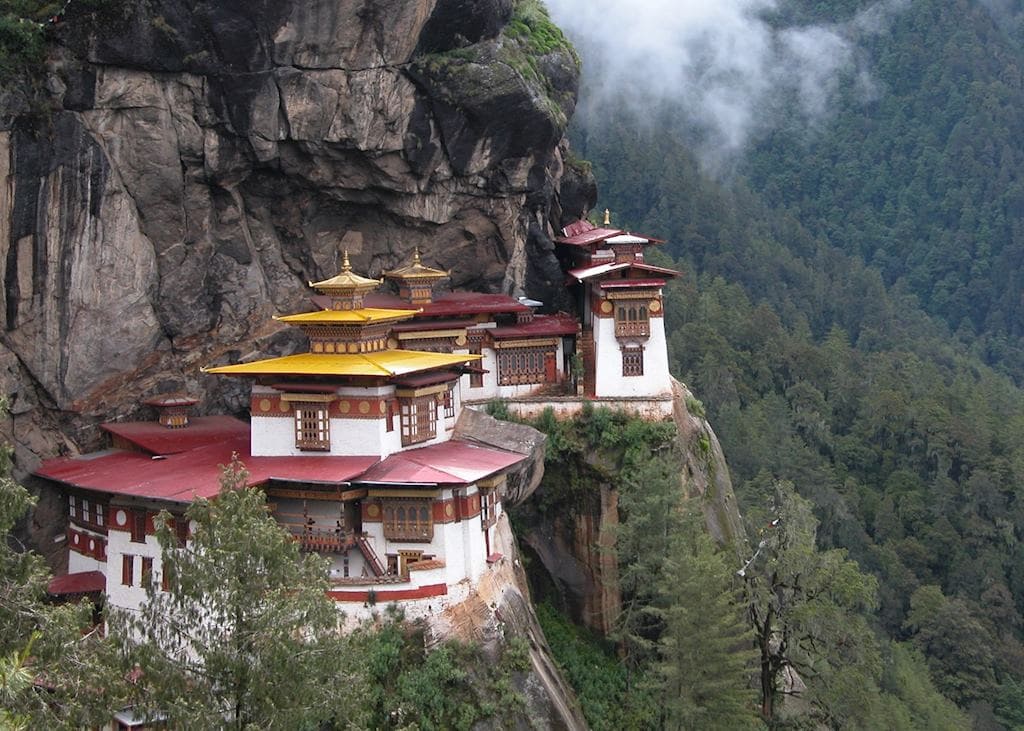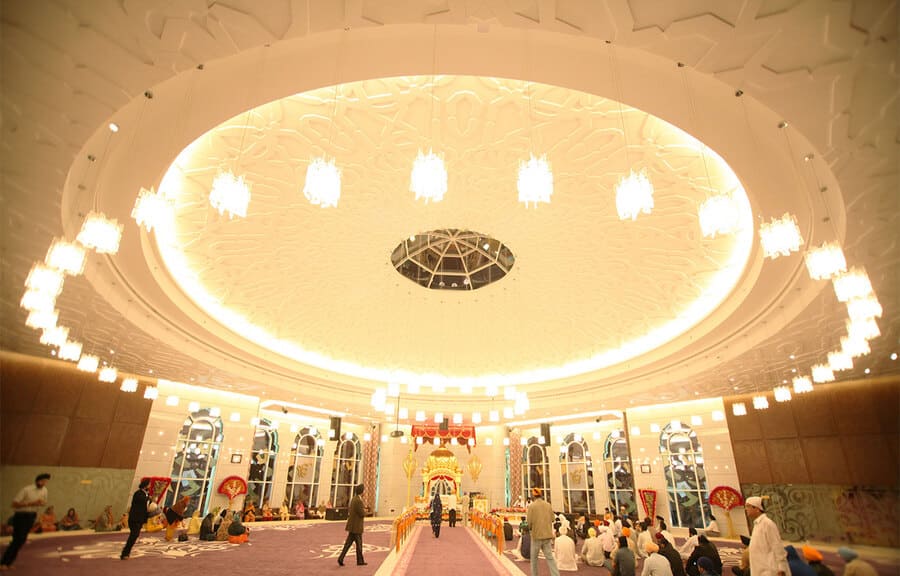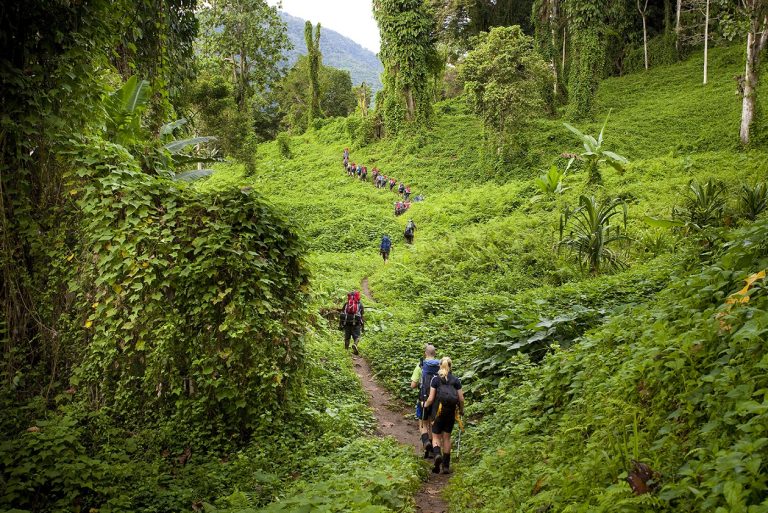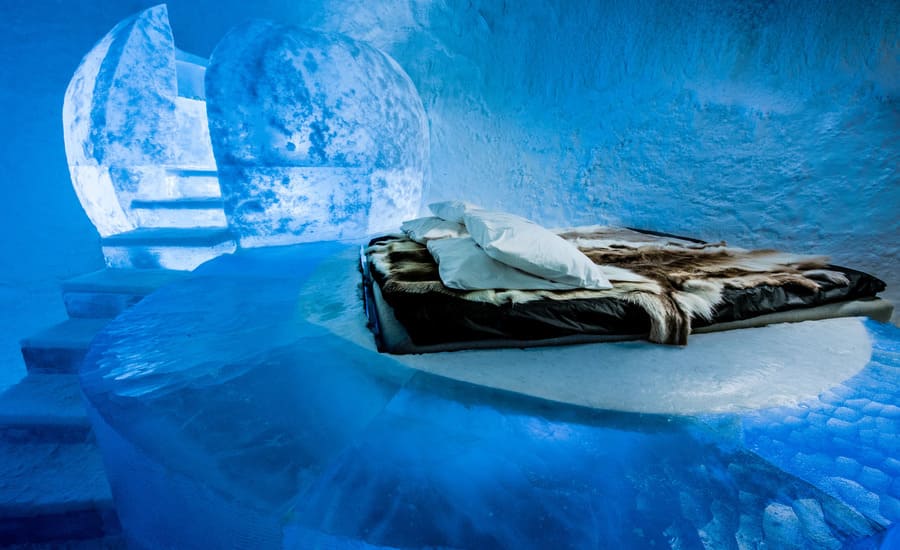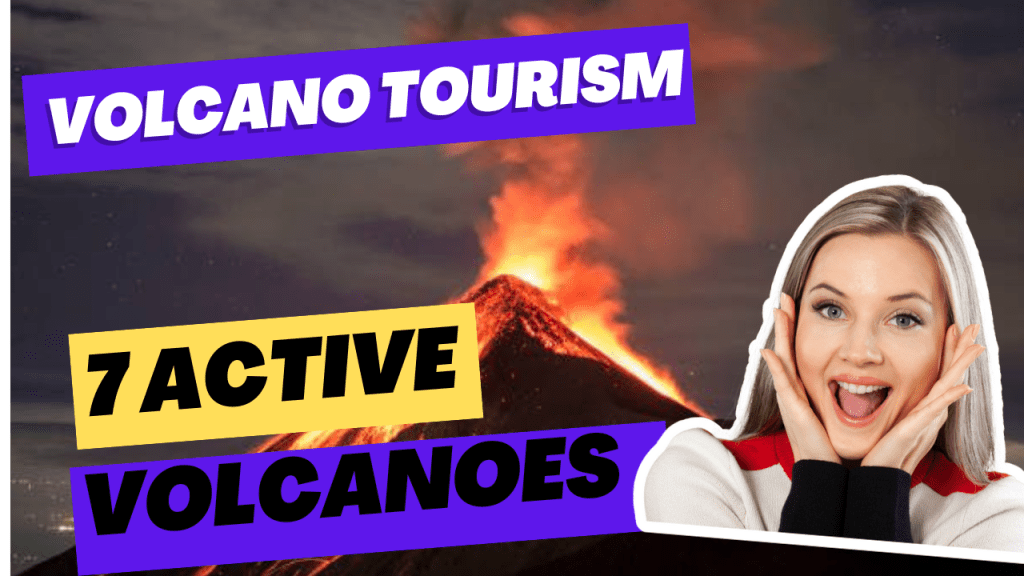Theme parks are generally viewed as fun and exciting destinations. Not all rides, however, are equal; some have developed a notorious reputation for being hazardous or even fatal. These rides serve to remind us that thrills sometimes involve actual danger.
Learn about the world’s most hazardous rides that push thrill-takers to the limit. From mountain traverses to sea crossings, these fatal trips are not for the weak.
In this blog, we’ll explore the top 10 deadliest rides that have claimed lives, caused injuries, or left riders traumatized. Be prepared—this list is not for the weak of heart!
The Smiler – Alton Towers, UK
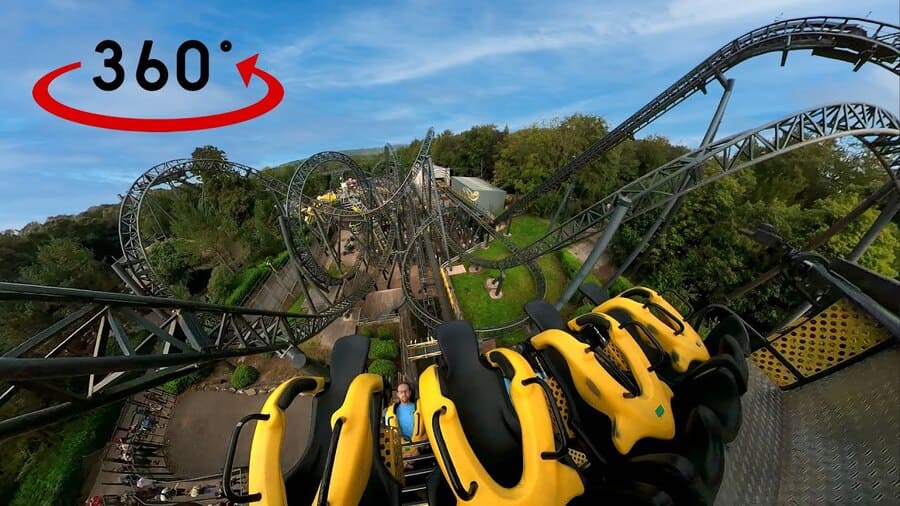
16 people were hurt in the 2015 incident, and two of them lost limbs. What Went Wrong: A human error and a system oversight caused a riding carriage to collide with a stalled one. The disaster stunned the amusement industry, even though it reopened with improved safety procedures.
One of the world’s most talked-about and record-breaking roller coasters is the Smiler at Alton Towers Resort in the United Kingdom. A must-ride for thrill-seekers and coaster fans, this thrill ride is situated in Staffordshire, England, and is well-known for its world-record 14 inversions. The Smiler has a dark, psychological concept that heightens the horrifying thrill, but it’s not just about loops and speed.
Facts at a Glance
| Feature | Detail |
|---|---|
| Location | Alton Towers, Staffordshire, UK |
| Opened | May 31, 2013 |
| Ride Type | Steel roller coaster |
| Manufacturer | Gerstlauer |
| Height | 98 feet (30 meters) |
| Speed | Up to 52.8 mph (85 km/h) |
| Number of Inversions | 14 (World Record) |
| Ride Duration | Approx. 2 minutes 45 seconds |
| Cost of Construction | £18 million |
Tips for Riders
Height Requirement : A minimum height of 1.4 meters, or around 4 feet 7 inches, is required.
Best Time to Ride : To avoid long lines, the best times to ride are in the early morning or late afternoon.
Ride Photo Location: Following the last inversion
Not Recommended For : Vertigo sufferers, people with heart issues, and people who don’t like rough rides are not advised to ride.
Action Park’s Alpine Slide – New Jersey, USA
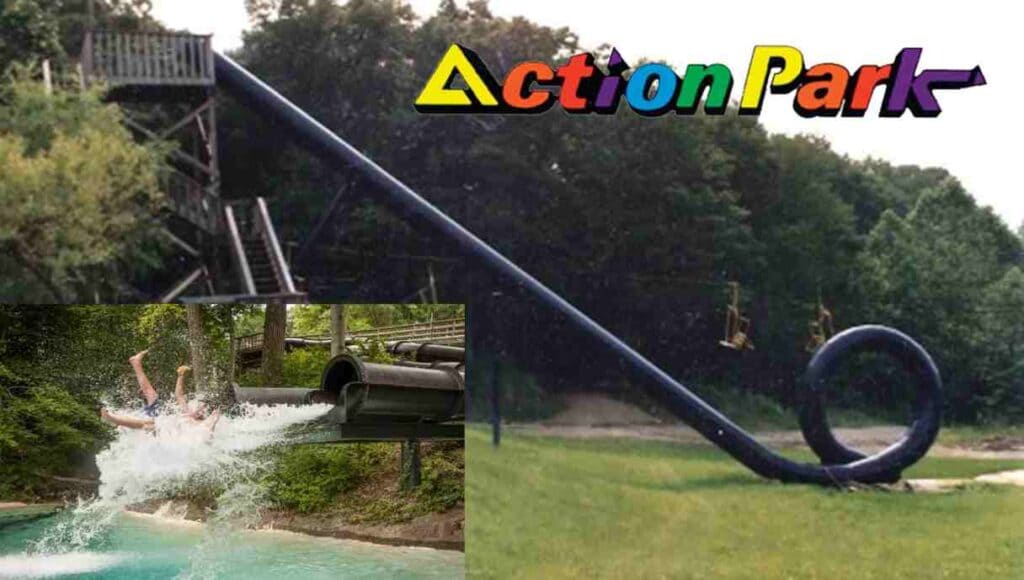
The 2,700-foot Alpine Slide at Action Park was more than just a typical amusement park feature; it was a monument to extreme engineering made of fiberglass and concrete that would come to be known as “Class Action Park.” This coaster alone was one of the most dangerous “rides” ever built, causing innumerable injuries and at least one fatality throughout its 1977 run until the park’s closing in 1996.
It’s called “Traction Park.” The Reason It’s Lethal: The concrete track of this ride was bumpy, and the sleds were poorly built. Numerous injuries and even fatalities resulted from riders frequently flying off the track at high speeds. Even though Action Park closed in the 1990s, its reputation as one of the most hazardous parks ever endures.
Key Facts at a Glance
| Feature | Detail |
|---|---|
| Location | Vernon Township, New Jersey, USA |
| Opened | 1978 |
| Closed | 1996 (as Action Park) |
| Ride Type | Alpine Slide / Summer Bobsled Track |
| Track Length | Over 2,700 feet (approx. 823 meters) |
| Ride Duration | Approx. 2–3 minutes |
| Construction Material | Concrete track with fiberglass sleds |
| Injury Rate | Estimated hundreds per season |
| Fatalities | 1 confirmed death (1980) |
Tips If You Visit Modern Alpine Slides
Here are some tips for staying safe if you’re going to a modern alpine slide (not Action Park):
Always wear the safety gear provided
Keep your hands inside the sled
Brake on sharp curves
Never try to race others
Don’t ride if under the influence or medically at risk
Big Dipper – Battersea Park, London
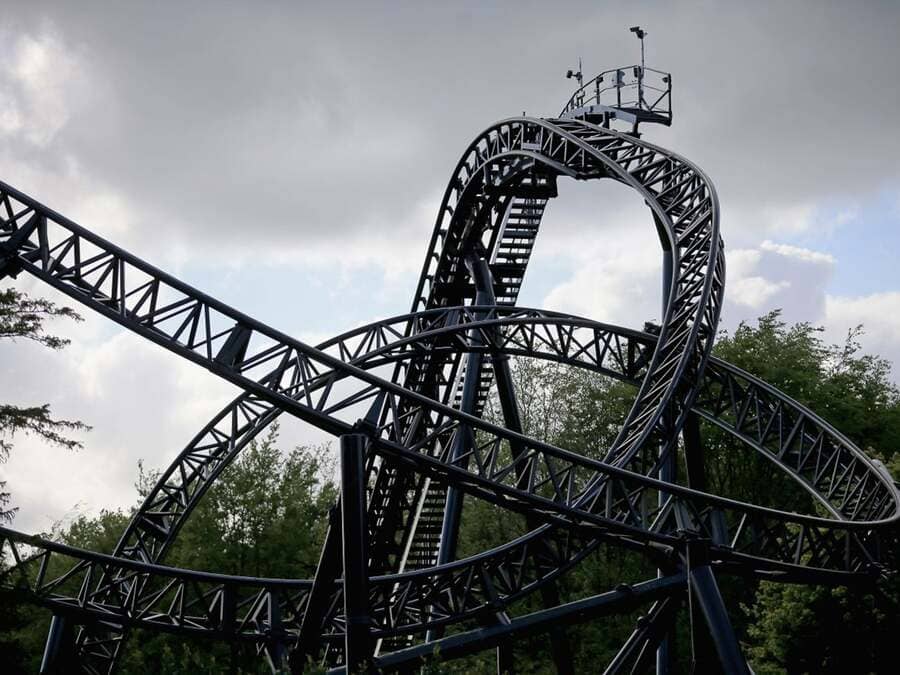
Disaster Year: 1972 Tragic event: When the wooden coaster’s cars broke free from the chain lift and rolled rapidly backward, five kids perished. In British history, it is still regarded as one of the worst roller coaster catastrophes.
Not for its excitement, Battersea Park Funfair in London’s Big Dipper is remembered for being the scene of the worst roller coaster accident in British history. A popular ride in a busy post-war amusement park turned into a tragic icon and a warning about the safety of amusement rides. A somber chapter in the history of British amusement parks, this ride was once a source of excitement and laughter.
The Big Dipper was a classic wooden roller coaster constructed in 1951 for the Festival of Britain. The coaster was a popular family attraction in the 1950s and 1960s
Key Facts at a Glance
| Feature | Detail |
|---|---|
| Location | Battersea Park Funfair, London, UK |
| Opened | 1951 |
| Incident Date | May 30, 1972 |
| Ride Type | Wooden roller coaster |
| Max Height | Approx. 45 feet (14 meters) |
| Ride Cars | 3-car wooden train with bench seating |
| Fatalities | 5 children |
| Injuries | Over 13 people injured |
| Status | Permanently closed post-accident |
| Cause of Disaster | Over 13 people were injured |
Thunder River Rapids – Dreamworld, Australia
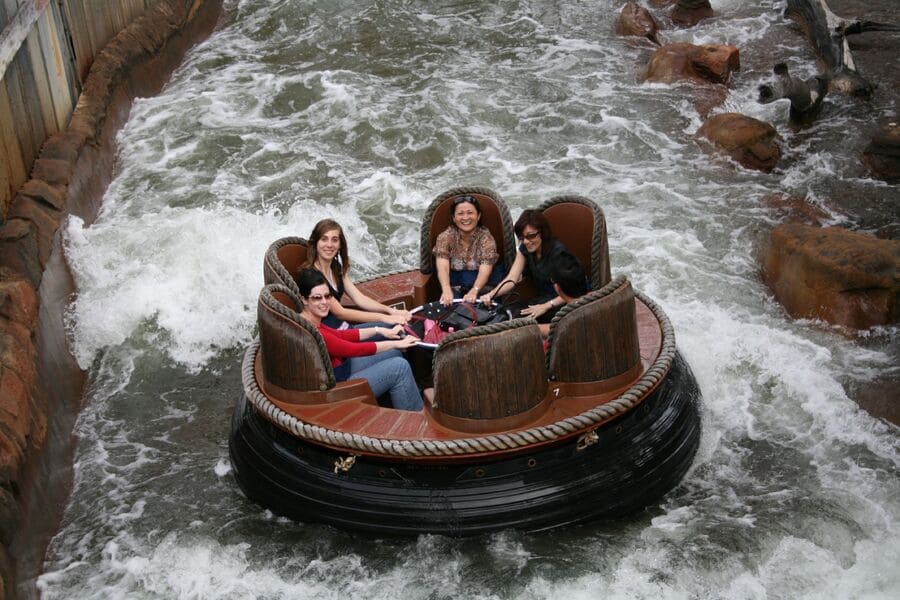
Deathly Event: 2016
What took place: Four individuals were killed after a raft flipped due to a fault. Although it was a water ride, the mishap revealed serious weaknesses in the maintenance and emergency systems.
One of Dreamworld’s oldest and most well-liked rides was the Thunder River Rapids. Large circular rafts floated along a man-made river with gentle rapids, bumps, and splashes, simulating whitewater rafting.
At one point, the Thunder River Rapids Ride at Dreamworld on Australia’s Gold Coast was regarded as a secure and kid-friendly attraction. However, on October 25, 2016, this seemingly innocuous water attraction became the scene of Australia’s greatest amusement park disaster due to a horrifying malfunction. This tragedy stunned the country, spurred a national dialogue about ride safety, and altered Australian amusement park regulations forever.
Key Facts at a Glance
| Feature | Detail |
|---|---|
| Location | Dreamworld, Gold Coast, Queensland, Australia |
| Opened | 1986 |
| Closed | October 25, 2016 (after fatal accident) |
| Ride Type | River rapids water ride |
| Ride Duration | Approx. 4 minutes |
| Ride Vehicles | Circular rafts (6-person capacity) |
| Fatalities | 4 (2 men, 2 women) |
| Injuries | None physically, but traumatic impact on witnesses |
| Cause of Incident | Conveyor belt malfunction + raft collision |
| Status | Permanently decommissioned |
Mindbender – Galaxyland, Canada
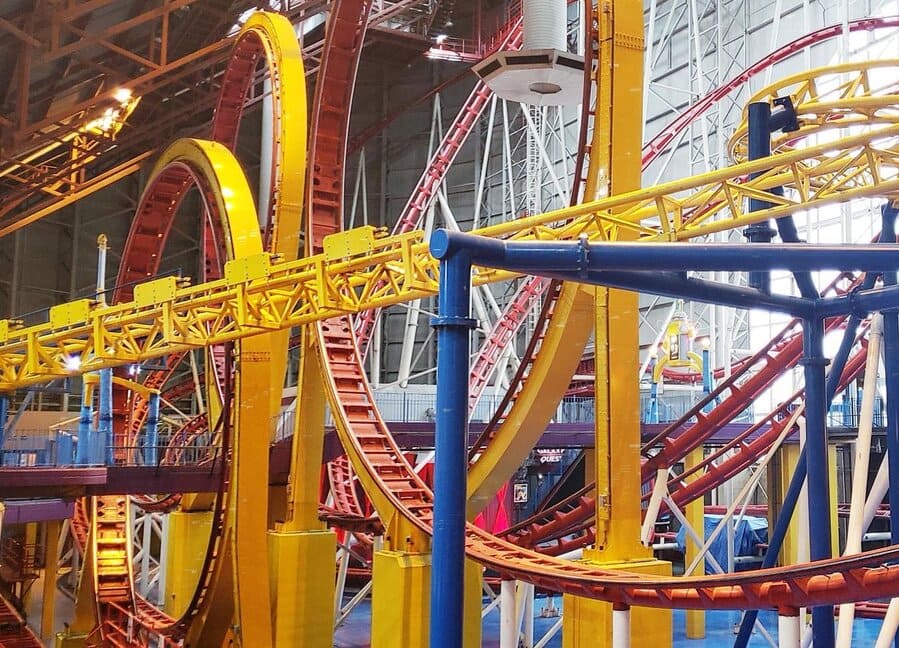
Accident: Three passengers were killed in a derailment in 1986.
Details: One of the wheel assemblies on the indoor triple-loop roller coaster had a mechanical failure. An automobile went off the track within a packed shopping mall as a result of the ensuing derailment.
The highest and fastest indoor triple-loop roller coaster in the world was originally the Mindbender at Galaxyland, which is housed inside West Edmonton Mall in Alberta, Canada. Designed to take excitement to the next level, it swiftly rose to fame as a favorite ride among thrill-seekers.
Key Facts at a Glance
| Feature | Detail |
|---|---|
| Location | Galaxyland, West Edmonton Mall, Alberta, Canada |
| Opened | December 1985 |
| Incident Date | June 14, 1986 |
| Ride Type | Steel indoor roller coaster |
| Manufacturer | Schwarzkopf Industries (Germany) |
| Max Height | 44 meters (145 feet) |
| Top Speed | 96.5 km/h (60 mph) |
| Loops | 3 vertical loops |
| Fatalities | 3 adults |
| Injuries | At least 19 |
| Status | Permanently closed (retired in 2023) |
| Cause of Disaster | Mechanical failure due to loose wheel assembly |
Haunted Castle – Six Flags Great Adventure, USA
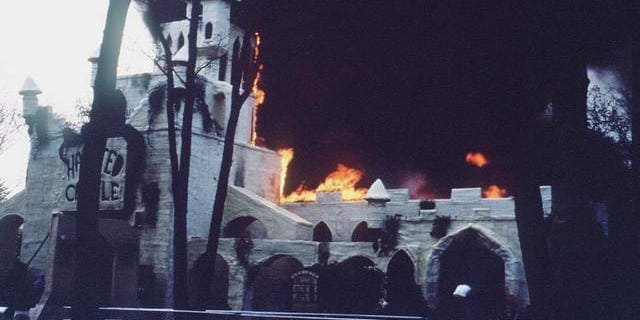
Tragic: Eight teens were killed in a fire in 1984.
Root Cause: This gloomy ride became a death trap due to flammable building materials and a deficiency of smoke alarms. Before rescue personnel could act, the fire quickly spread.
Six Flags Great Adventure’s Haunted Castle attraction in Jackson Township, New Jersey, was designed to give families and thrill-seeking teenagers an enjoyable, eerie experience.
Key Facts at a Glance
| Feature | Detail |
|---|---|
| Location | Six Flags Great Adventure, New Jersey, USA |
| Opened | 1979 |
| Incident Date | May 11, 1984 |
| Attraction Type | Walk-through haunted house |
| Construction | Trailers connected into a maze, with foam & plywood |
| Fatalities | 8 teenage boys (ages 15–19) |
| Cause of Fire | Suspected arson (never proven), rapid ignition of flammable materials |
| Major Failures | No fire alarms, sprinklers, or emergency exits |
| Status | Permanently closed and demolished after the fire |
At Six Flags, the Haunted Castle was a well-liked haunted house attraction. Constructed with 17 interconnected tractor-trailer units, its purpose was to frighten and perplex visitors with:
Dark hallways
Lighting strobes
Machines that produce fog
Costumed actors
Verdugo Alpine Coaster – Mexico City, Mexico
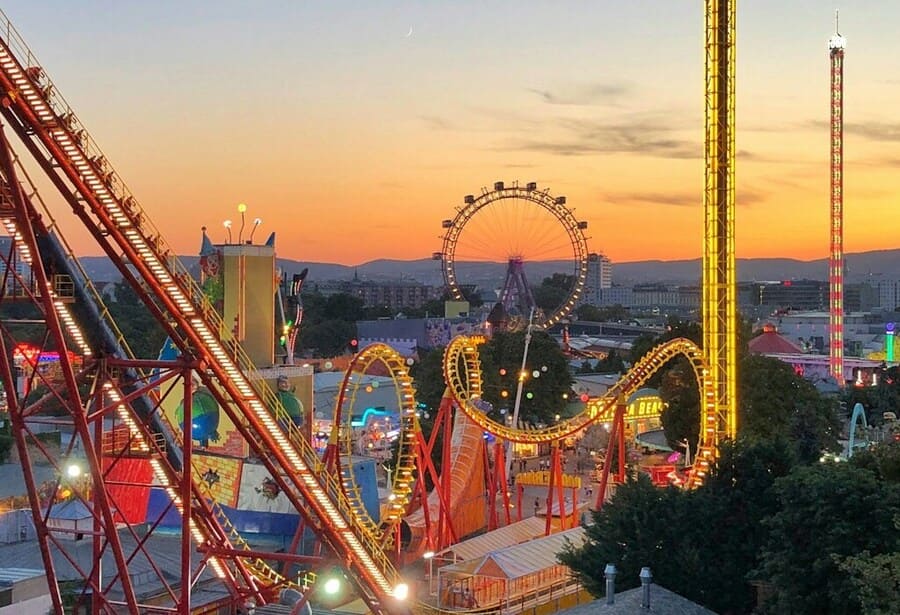
Notoriety: Among the few rides in recent years to have many fatalities. Design flaw: There were no safety barriers on this one-car journey. High speeds on tight curves and brake failures have resulted in riders being ejected from the coaster.
With its thrilling speed and abrupt curves down a hillside, Mexico City’s Verdugo Alpine Coaster was created as a gravity-powered experience across natural terrain. However, in 2019, what ought to have been a picturesque experience devolved into a fatal catastrophe, prompting serious concerns regarding safety regulations in adventure parks throughout Latin America. A cart on the Verdugo coaster derailed at high speed on March 28, 2019, killing two women and badly injuring two more. This incident brought to light risky neglects in ride maintenance and operator supervision.
Key Facts at a Glance
| Feature | Detail |
|---|---|
| Location | Parque de Diversiones, Mexico City, Mexico |
| Attraction Type | Alpine coaster / mountain slide |
| Mechanism | Gravity-powered cart with hand brakes |
| Incident Date | March 28, 2019 |
| Fatalities | 2 female tourists |
| Injuries | 2 others, including a child |
| Max Speed | Approx. 40–50 km/h (unregulated) |
| Ride Vehicle | 2-person open cart with seat belts and hand brake |
| Cause of Incident | Excessive speed + mechanical failure |
| Safety Measures Lacking | No automatic braking system or electronic speed regulation |
Derby Racer – Revere Beach, USA
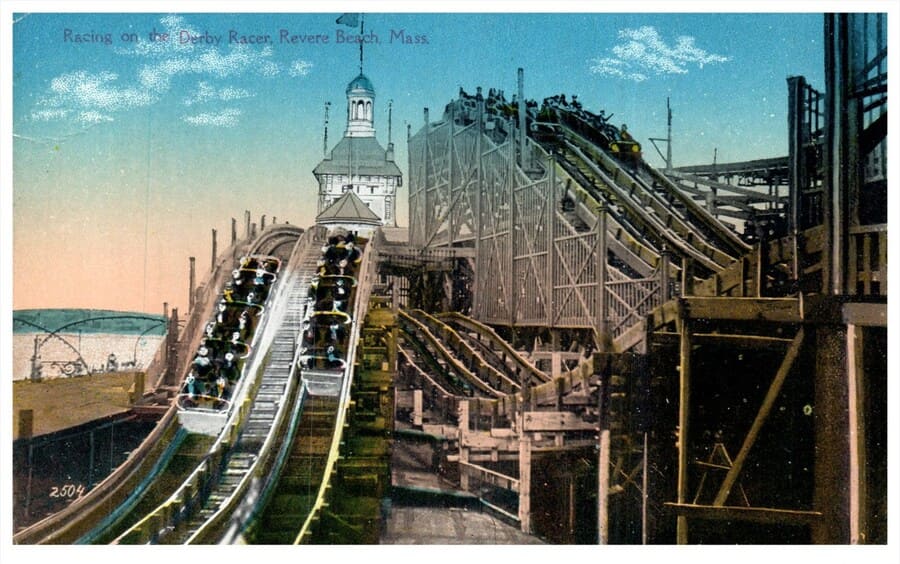
Historic Horror: This fast-moving carousel, which has been in operation since the early 1900s, has murdered multiple passengers. Why Dangerous: Extreme lateral force frequently caused riders to be hurled off. Before more stringent safety regulations were implemented, the attraction gained notoriety.
Inspired by horse racing, the Derby Racer was one of the original dual-track roller coasters. The idea gave the already fast-paced ride a competitive thrill by allowing two coaster trains to “race” side by side. It included open-air seating, wooden supports, and sharp bends and dips that were typical for the time but exceedingly dangerous by today’s standards. The absence of restraints, a common element (or lack thereof) in early 20th-century entertainment design, was what set the ride apart.
Key Facts at a Glance
| Feature | Detail |
|---|---|
| Location | Revere Beach, Massachusetts, USA |
| Opened | Early 1900s |
| Ride Type | Wooden racing roller coaster |
| Incident Date | May 30, 1911 |
| Fatalities | 1 confirmed (Mary Bancroft, 22) |
| Ride Speed | Approx. 50–60 mph (very fast for the era) |
| Cause of Accident | Rider ejected from seat during sharp turn |
| Safety Measures | Minimal; no restraints, lap bars, or seat belts |
| Status | Permanently closed and dismantled |
Batman: The Ride – Six Flags Over Georgia
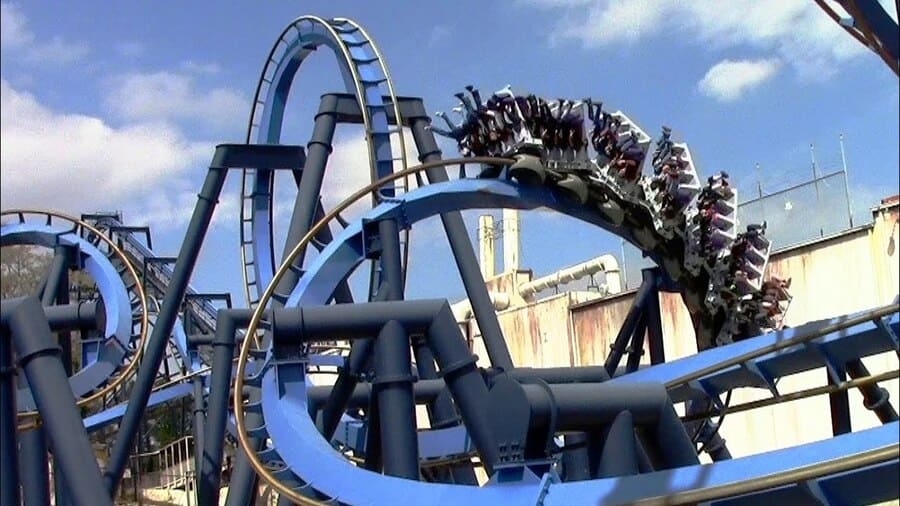
Not the Ride, but the Danger: In 2008, a teenager was killed by a train after entering a forbidden area to recover a misplaced hat. Knowledge Acquired: Although it provides passengers with a safe trip, it serves as a sobering reminder of the purpose of safety zones.
One of Six Flags’s most recognizable coasters is Batman: The Ride. Bolliger & Mabillard designed it, and it has:
Inverted trains with passengers’ legs hanging loosely
Five extreme inversions, such as zero-G rolls and vertical loops
Up to 50 mph in speed
G-forces and sharp twists above four Gs
The ride, which transports guests to a Gotham City adventure, is commended for its smoothness and theming.
Key Facts at a Glance
| Feature | Detail |
|---|---|
| Location | Six Flags Over Georgia, Austell, Georgia, USA |
| Ride Type | Steel inverted roller coaster |
| Manufacturer | Bolliger & Mabillard (B&M) |
| Opened | May 3, 1997 |
| Height | 105 feet (32 m) |
| Top Speed | 50 mph (80 km/h) |
| Inversions | 5 (loops, corkscrews) |
| Incident Date | June 28, 2008 |
| Victim | 17-year-old boy from Columbia, South Carolina |
| Fatality Cause | Decapitation after entering restricted area |
| Ride Status | Still operational with enhanced safety protocols |
Mission: Space – Epcot, Florida, USA

Deaths Reported: 2 fatalities in the early 2000s
What’s at Risk: This space flight trip simulates strong G-forces that can be debilitating. People with pre-existing diseases are particularly vulnerable, and several riders have reported experiencing nausea and chest pain.
One of the most cutting-edge spaceflight simulators in the world is Mission: Space at Walt Disney World’s Epcot. Through a centrifuge system that spins and tilts simultaneously, it exposes riders to tremendous G-forces—up to 2.5 Gs—in an attempt to replicate a true NASA-style voyage to Mars. However, in 2005, a 4-year-old kid died after experiencing this ultra-immersive experience, which brought serious questions regarding medical warnings and intensity levels at family-friendly parks like Disney.
Key Facts at a Glance
| Feature | Detail |
|---|---|
| Location | Epcot, Walt Disney World, Florida, USA |
| Ride Type | Centrifuge-based space simulator |
| Opened | August 15, 2003 |
| Height Requirement | 44 inches (112 cm) |
| G-Forces | Up to 2.5 Gs |
| Number of Riders per Capsule | 4 |
| Incident Date | June 13, 2005 |
| Fatality | 4-year-old boy from Pennsylvania |
| Cause of Death | Undiagnosed heart condition (myocarditis) |
| Ride Status | Operational with safety modifications |
FAQ: Top 10 Deadliest Rides
Q1. Are roller coasters dangerous?
A. Although most are extremely safe, mishaps can occur due to inadequate maintenance or human error.
Q2. What’s the most dangerous ride ever?
A. Due to numerous fatalities and hundreds of injuries, Action Park’s Alpine Slide is regarded as one of the most infamous.
Q3. How can I stay safe on thrill rides?
A. Never enter restricted areas, keep your arms and legs within, and always abide by safety regulations.

